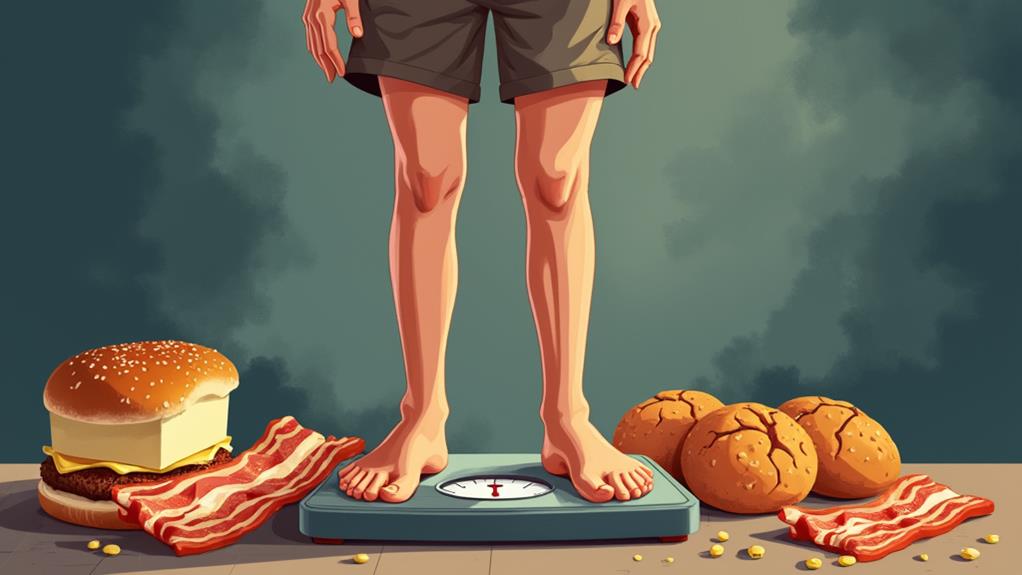
On a ketogenic diet, initial rapid weight loss usually ranges from 2 to 10 pounds within the first week, primarily due to glycogen depletion and water loss. Following this initial phase, consistent weight loss of 1-2 pounds per week is typical as the body shifts to burning fat for energy. Various factors, such as adherence to the diet, individual metabolism, and lifestyle, greatly influence long-term weight loss outcomes. Research indicates that individuals can lose up to 30 pounds over a couple of months with diligent adherence. Exploring these aspects of the keto diet can offer deeper insights into its effectiveness.
Key Takeaways
- Initial weight loss can range from 2 to 10 pounds in the first week, primarily due to water weight reduction.
- After initial adaptation, expect consistent weight loss of 1-2 pounds per week as the body shifts to fat burning.
- Larger individuals may experience more pronounced initial weight loss due to higher glycogen stores.
- Proper hydration and meticulous carb tracking are essential for sustained weight loss and adherence to the keto diet.
- Long-term weight management benefits include improved appetite control and sustained fat utilization, supporting gradual and steady weight loss.
Understanding the Keto Diet
The ketogenic diet, commonly referred to as the keto diet, is a high-fat, low-carbohydrate nutritional regimen designed to shift the body's primary fuel source from glucose to ketone bodies derived from fat.
This change is achieved by drastically reducing carbohydrate intake to 20-50 grams per day, compelling the body to enter a metabolic state known as ketosis. The typical macronutrient ratio for a keto diet is 70-80% fat, 5-10% carbohydrates, and 10-20% protein.
This metabolic shift can take 3-4 days, during which individuals may experience symptoms like dry mouth and fatigue.
Effective keto meal planning is vital to achieving and maintaining ketosis. Meals are structured to emphasize high-fat foods such as avocados, nuts, and oils, alongside moderate protein sources like meat, fish, and eggs.
Low-carb vegetables like spinach and cauliflower are also incorporated to guarantee nutritional balance.
Keto snack options play an essential role in adhering to the diet, providing convenient ways to sustain energy levels and curb hunger.
Common keto snacks include cheese, olives, and hard-boiled eggs, all of which align with the diet's macronutrient requirements.
The Science Behind Ketosis
Inducing ketosis involves a complex interplay of metabolic processes that pivot the body's primary energy source from carbohydrates to fats. By drastically reducing carbohydrate intake to 20-50 grams per day, the body is compelled to seek alternative fuel sources. This metabolic adjustment typically takes several days and varies depending on individual factors such as metabolic rate, body fat levels, and strict adherence to the low-carb regimen.
During the initial adaptation phase, some individuals may experience "keto flu" symptoms such as headaches and irritability, which are temporary and resolve as the body adjusts.
During ketosis, the liver plays a significant role by converting fatty acids into ketone bodies through a process known as ketone production. These ketone bodies, including beta-hydroxybutyrate, acetoacetate, and acetone, serve as an essential energy source for the brain and other tissues, compensating for the lack of glucose derived from carbohydrates.
The ketosis benefits extend beyond just weight loss; they include improved mental clarity, sustained energy levels, and potential therapeutic effects for certain neurological conditions.
Research underscores the efficacy of the ketogenic diet in inducing rapid initial weight loss, primarily due to glycogen depletion and associated water loss. As the body continues to adapt to burning fat for fuel, sustained weight loss of 1-2 pounds per week is observed, highlighting the long-term benefits of ketone production in weight management.
Initial Weight Loss
Experiencing rapid initial weight loss is a hallmark of the ketogenic diet, often characterized by a swift decrease of 2 to 10 pounds within the first week. This phenomenon can be attributed to the depletion of glycogen stores, which leads to the body shedding water weight.
Glycogen, a stored form of glucose, binds with water in the muscles and liver, with approximately 3 grams of water for every gram of glycogen. As glycogen is burned for energy due to carbohydrate restriction, the associated water is also released, contributing to the rapid changes observed in initial results.
Larger individuals may notice more substantial initial weight loss owing to their greater glycogen stores and corresponding water retention. However, it is essential to understand that these rapid changes primarily reflect water weight loss rather than fat reduction.
As the body adapts to ketosis, the rate of weight loss typically stabilizes to an average of 1 to 2 pounds per week, indicating a shift from glycogen and water depletion to fat metabolism. This process is supported by the mechanisms of ketosis that enhance fat oxidation and mobilization.
Understanding these dynamics is vital for managing expectations and recognizing that the initial results on a keto diet are part of a broader process of metabolic adaptation.
Water Weight Reduction
Rapid initial weight loss on a ketogenic diet can be primarily attributed to water weight reduction, a phenomenon closely tied to glycogen depletion. Glycogen, stored in the muscles and liver, binds with approximately three grams of water for every gram of glycogen.
When the body enters ketosis and begins to deplete these glycogen reserves, the bound water is released, leading to increased urination and subsequent weight loss. During the first week of a ketogenic diet, individuals may experience weight loss ranging from 1 lb (0.5 kg) to over 10 lbs (5 kg), largely due to this process.
Larger individuals often see more significant initial water weight loss owing to their higher glycogen stores. This rapid reduction in water retention can provide immediate motivation for those beginning the diet.
However, it is vital to recognize that this initial weight loss is not indicative of fat loss. The first month on keto can see an average weight loss of 10-15 pounds, primarily from water weight.
To maintain proper hydration and mitigate potential negative effects, individuals should adopt effective hydration strategies. This includes consuming adequate fluids and electrolytes to compensate for the increased urination.
As the body adjusts to ketosis and begins to burn fat for fuel, the rate of weight loss generally slows, shifting focus from water weight reduction to fat loss.
Transition to Fat Loss
Following the initial phase of rapid weight loss due to water depletion, the body begins a critical shift to fat loss once it enters ketosis. This metabolic state, characterized by the body's change from carbohydrate dependence to fat utilization, typically takes several days to achieve. Factors such as individual metabolism and carbohydrate intake influence the time required to reach ketosis.
Once in ketosis, it's important to monitor ketone levels, targeting 1.5 to 3.0 mmol/L for ideal results.
Upon entering ketosis, the process of fat adaptation ensues, wherein the body becomes increasingly efficient at burning fat for energy. Research indicates that after achieving fat adaptation, individuals on a ketogenic diet can expect to lose an average of 1-2 pounds per week. This steady fat loss is a result of the body's sustained ability to utilize fat as its primary fuel source instead of carbohydrates.
Studies on obese patients reveal that significant fat loss can occur post-adaptation, with an average weight loss of 13.6 kg (30 pounds) observed within two months.
To maintain ketosis and guarantee ongoing fat loss, precise macro tracking and vigilance against hidden carbs are essential. Regular monitoring of ketone levels can further aid individuals in evaluating their metabolic state, assuring they remain in ketosis and continue to experience consistent fat loss.
Weekly Weight Loss Expectations
During the initial week on a ketogenic diet, individuals typically experience a substantial weight loss of 2 to 10 pounds, primarily attributed to glycogen depletion and water loss.
As the body shifts to burning fat for fuel, a more consistent weekly weight loss of 1 to 2 pounds is observed.
Factors such as adherence to the diet, hydration levels, and individual metabolic responses play significant roles in influencing these weight loss trends.
This rapid initial loss can also be linked to a reduction in ghrelin levels, which helps in regulating appetite and enhancing feelings of fullness.
Early Weight Loss Trends
In the initial phase of a ketogenic diet, individuals often experience a significant reduction in weight, primarily attributed to the depletion of glycogen stores and subsequent water loss. This phenomenon leads to initial results that can be quite rapid.
Typically, individuals can expect to lose approximately 2-10 pounds within the first week. This rapid change is primarily due to the body's shift in energy utilization, where it starts to burn stored glycogen, releasing water in the process.
After the initial week, the weight loss trend usually stabilizes, with average fat loss rates of about 1-2 pounds per week as the body adapts to ketosis. This steady rate is a more sustainable and healthy pace of weight reduction.
Studies highlight that obese patients on a ketogenic diet lost an average of 13.6 kg (30 pounds) within two months, with a significant 88% achieving more than 10% of their initial weight loss.
Key points to take into account:
- Initial weight loss is primarily water weight.
- Fat loss becomes more consistent after the first week.
- Adherence to macronutrient ratios is essential.
- Monitoring ketone levels helps maintain ketosis.
Understanding these early weight loss trends provides a realistic framework for expectations.
Factors Influencing Weight Loss
Understanding the rapid initial weight loss on a ketogenic diet sets the stage for examining the factors that influence continued weight loss and weekly expectations. Following the initial phase, individuals typically experience a weight reduction of 1-2 pounds per week as they shift to fat burning during ketosis. This steady loss is influenced by various factors including diet adherence and individual variability in metabolic factors.
Consistency in maintaining ketosis is essential; deviations can result in plateaus or slower progress.
Body composition plays a significant role, with individuals having higher body fat percentages often experiencing more rapid initial weight loss. Psychological impacts and lifestyle influences, such as dietary preferences and social interactions, also affect adherence to the diet and, consequently, weight loss outcomes.
Age-related differences and hormonal effects can further modulate the rate of weight loss, requiring tailored approaches for different demographic groups.
Research indicates significant success in obese individuals, with an average loss of 13.6 kg (30 pounds) in two months, highlighting the potential for achieving more than 10% of initial weight loss.
Ultimately, long-term sustainability of weight loss on a ketogenic diet hinges on integrating these factors effectively to maintain progress.
Factors Influencing Weight Loss

Several factors influence weight loss on a keto diet, including initial water loss, which often results in a rapid decrease in weight during the first week due to glycogen depletion.
Staying hydrated and maintaining electrolyte balance can help manage symptoms like headaches and fatigue during this phase.
The metabolic adaptation period also plays a significant role, as the time required for the body to enter a state of ketosis can vary, impacting the rate of fat reduction.
Long-term fat reduction is further influenced by the individual's adherence to the diet and their ability to consistently maintain ketosis.
Monitoring for potential nutrient deficiencies is also important for sustained weight loss and overall health.
Initial Water Loss
When starting a keto diet, one of the most notable initial changes is the rapid loss of water weight, which can range from 2 to 10 pounds within the first week. This phenomenon mainly occurs due to the depletion of glycogen stores, which are carbohydrate reserves in the body. As glycogen binds with approximately 3 grams of water for every 1 gram of glycogen, burning through these stores results in significant water loss.
To better understand this process, consider the following points:
- Glycogen Depletion: As the body shifts into ketosis, glycogen stores are utilized for energy, leading to substantial water release.
- Body Size and Glycogen: Larger individuals typically have higher glycogen reserves, resulting in more pronounced initial water weight loss.
- Hydration Strategies: Given the substantial water loss, maintaining proper hydration is vital to avoid dehydration and its associated symptoms.
- Weight Loss Misconceptions: Initial weight loss is mainly water, not fat, which can lead to misconceptions about the effectiveness of the diet in the early stages.
Understanding these factors is essential for managing expectations and ensuring a balanced approach to the keto diet.
Effective hydration strategies are necessary to mitigate the effects of rapid water loss and support overall well-being during this initial phase.
Metabolic Adaptation Period
During the metabolic adaptation period on a keto diet, the body undergoes significant physiological changes as it shifts from relying on carbohydrates to utilizing fat as the primary energy source. This change typically spans a few days to a week.
Initially, the body depletes its glycogen stores, which are carbohydrate reserves bound with water. As these stores are exhausted, the body releases the water, resulting in an initial weight loss of 2-10 pounds, primarily due to water loss.
Metabolic flexibility, the body's ability to switch between fuel sources, plays a vital role during this period. Individual metabolic rates, body composition, and adherence to the diet's macronutrient ratios are key factors influencing the duration and effectiveness of this change.
Adaptation strategies, such as maintaining strict dietary guidelines, are essential for facilitating the body's efficient use of ketones.
The process of fat adaptation, wherein the body becomes proficient at burning fat for energy, varies among individuals. Studies indicate that once ketosis is achieved, a steady weight loss of 1-2 pounds per week can be expected, contingent upon strict adherence to the diet.
This phase marks the body's enhanced capability to utilize fat, impacting overall weight loss.
Long-Term Fat Reduction**
Long-term fat reduction on a keto diet is influenced by a multitude of factors that extend beyond initial water weight loss. After the initial phase, individuals can expect to lose an average of 1-2 pounds per week. This sustained weight loss is primarily driven by fat adaptation, where the body shifts from using carbohydrates to fats as its main energy source, thereby enhancing fat-burning efficiency.
Several key factors influence long-term success on a keto diet:
- Health Status: Individuals with higher body fat percentages often experience more rapid initial fat loss due to greater glycogen depletion.
- Consistency in Adhering to Keto Macros: Maintaining the typical keto macronutrient ratio—70-80% fat, 5-10% carbohydrates, and 10-20% protein—is vital for staying in ketosis.
- Daily Habits: Practices such as clean keto eating, regular physical activity, and adequate hydration greatly enhance fat-burning efficiency and help in muscle preservation.
- Monitoring Ketone Levels and Caloric Intake: Regularly checking ketone levels and being mindful of caloric intake can prevent common pitfalls, such as hidden carbohydrates in processed foods or overeating despite a high-fat diet.
Long-Term Weight Loss
Achieving sustained weight loss on a ketogenic diet typically involves an average reduction of 1-2 pounds per week after the initial phase of rapid water weight loss. Developing sustainable habits is essential for long-term success on this diet.
Studies indicate that consistent adherence to the keto lifestyle can lead to greater weight loss compared to traditional low-fat diets, as supported by meta-analyses showing more substantial reductions in body weight over time. Regular monitoring of blood markers and ketone levels can also help in tracking progress and ensuring ideal health.
Additionally, incorporating a variety of nutrient-dense foods can maintain excitement in meals and prevent nutritional deficiencies.
To prevent weight regain, strict adherence to keto macros is important, especially as individuals approach their goal weight and the rate of weight loss naturally slows. Long-term participants often report additional health benefits, including improved mental clarity, increased energy levels, and better skin health. These psychological effects can further motivate individuals to maintain their dietary regimen.
Tracking food intake and ketone levels consistently is essential for sustaining long-term weight loss, ensuring that individuals remain in a fat-burning metabolic state. This level of diligence helps reinforce sustainable habits that are significant for ongoing success.
Common Challenges

Starting on a ketogenic diet presents several challenges that can impede sustained adherence and weight loss success. A significant hurdle is maintaining meal variety while adhering to a strict limit of 20 grams of carbs daily. This restriction often leads to repetitive food choices, which can cause diet boredom.
Additionally, the initial phase may bring about "keto flu," characterized by fatigue and irritability, making it difficult to sustain motivation. The importance of recognition and early management of keto flu symptoms cannot be overstated, as it aids in hydration and electrolyte balance.
Hidden carbs in processed foods pose another issue, necessitating meticulous carb tracking and label reading. Portion control is also critical; overeating high-fat foods can lead to weight loss plateaus even when following keto guidelines. Confirming accurate ketone levels is essential for maintaining ketosis and preventing unintentional carb consumption.
Effective strategies to address these challenges include:
- Meal prepping: Plan and prepare meals in advance to confirm diversity and adherence.
- Motivation strategies: Set realistic goals and track progress to stay motivated.
- Snack alternatives: Find low-carb snacks to avoid hidden carbs and maintain portion control.
- Overcoming fatigue: Stay hydrated and consider electrolyte supplements to mitigate keto flu symptoms.
Health Benefits of Keto
The ketogenic diet offers several health benefits beyond weight loss, particularly including improved energy levels and better appetite control.
Studies indicate that the metabolic shift to burning fat for fuel can enhance physical performance and sustain energy during high-intensity activities.
Additionally, the reduction in appetite and cravings helps individuals manage their weight more effectively and maintain overall health improvements.
Research shows that the ketogenic diet can also considerably reduce inflammation and improve cardiovascular health, contributing to long-term wellness.
Improved Energy Levels
Shifting to a ketogenic diet can considerably enhance energy levels, a benefit supported by multiple studies and anecdotal reports. One significant advantage of ketosis is energy stabilization. When the body shifts from using carbohydrates to fats as its primary energy source, it results in more stable blood sugar levels, thereby reducing the peaks and troughs associated with high-carb diets. This leads to sustained energy and reduced fatigue.
Moreover, the brain efficiently uses ketones for fuel, contributing to enhanced mental clarity. Many individuals on a ketogenic diet report improved focus and cognitive function. This mental clarity is likely due to the consistent energy supply from ketones, which bypasses the fluctuations caused by carbohydrate consumption.
Additionally, individuals on a keto diet often observe increased endurance during physical activities. This is because fat, as an energy source, is more sustainable and abundant compared to glycogen derived from carbohydrates.
To summarize, the ketogenic diet promotes:
- Energy stabilization by maintaining consistent blood sugar levels.
- Enhanced mental clarity due to the brain's effective use of ketones.
- Improved physical endurance from a sustainable energy source.
- Overall liveliness once the body adapts to ketosis.
These factors collectively contribute to the heightened energy levels reported by keto dieters.
Appetite Control Benefits
While enhanced energy levels are a notable benefit of the ketogenic diet, another important advantage lies in its potent appetite control mechanisms. The ketogenic diet has been shown to considerably reduce appetite, with some studies indicating a 20-30% decrease in calorie consumption without feelings of deprivation. This is largely attributed to the high-fat content of the diet, which promotes slower digestion and enhances satiety levels.
Increased ketone levels during ketosis play a vital role in regulating hunger hormones such as ghrelin and leptin. This hormonal balance contributes to improved food satisfaction and reduced food cravings. Research supports this, with one study reporting a 50% reduction in the desire to eat after just a few weeks on the diet.
Moreover, the gradual release of energy from high-fat foods helps stabilize blood sugar levels, preventing the spikes that often trigger hunger and promoting energy stabilization. Many individuals on the keto diet report greater control over their cravings and a noticeable reduction in snacking behavior.
This appetite suppression is key for dietary adherence and sustained weight loss, making the ketogenic diet an effective tool for long-term weight management.
Potential Risks

Adopting a ketogenic diet can introduce a range of potential risks that warrant careful consideration. One primary concern is the potential for health risks associated with raised cholesterol levels due to increased saturated fat intake, which can heighten the risk of heart disease.
Moreover, the diet's restrictive nature can lead to nutrient deficiencies, as it limits the consumption of fruits, grains, and certain vegetables, potentially causing imbalances in essential vitamins and minerals.
For individuals with pre-existing liver concerns, the high fat content of the ketogenic diet can exacerbate liver conditions due to the increased metabolic load required for fat breakdown.
Additionally, there are significant ketoacidosis risks for those with type 1 diabetes, as excessively high blood ketone levels can result in dangerous complications.
Lastly, long-term adherence to the keto diet poses a risk of muscle loss due to calorie restriction and potentially inadequate protein intake. To mitigate these risks, careful dietary planning is essential.
Key points of concern include:
- Raised cholesterol levels and heart disease risk.
- Nutrient deficiencies from restricted food groups.
- Liver concerns due to increased metabolic load.
- Ketoacidosis risks for type 1 diabetics.
Adopting this diet requires mindful planning and medical supervision to guarantee balanced nutrition and overall health.
Tips for Success
Given the potential risks associated with the ketogenic diet, it becomes essential to approach this dietary regimen with a well-informed strategy to maximize benefits and minimize adverse effects. Key to success is meticulous meal planning and meal prepping. By structuring your meals in advance, you can guarantee adherence to the keto ratio of 70-80% fat, 5-10% carbs, and 10-20% protein, which is vital for effective weight loss.
Macronutrient tracking is fundamental; utilize apps and tools to monitor intake accurately. When grocery shopping, focus on keto-friendly foods like avocados, nuts, and leafy greens. Be wary of hidden carbohydrates in processed products. Instead, opt for whole, nutrient-dense items.
Crafting a variety of recipe ideas can prevent dietary boredom and enhance compliance. Portion control plays a key role in managing calorie intake, while selecting appropriate snack options like cheese or boiled eggs can prevent inadvertent carb consumption.
For those dining out, research menu options beforehand to make informed choices. Employ food substitutions to adapt traditional dishes to keto standards. Additionally, maintaining hydration and monitoring your ketone levels will further guarantee you remain in ketosis, optimizing fat burning.
Regular physical activity complements these efforts, enhancing overall weight loss outcomes.
Real-Life Experiences

Many individuals starting on a ketogenic diet report significant initial weight loss, often shedding between 10 to 15 pounds within the first month. This rapid reduction is largely attributed to water weight loss as glycogen stores are depleted.
Real-life experiences from the keto community underscore these findings, with many individuals sharing personal success stories that highlight both the challenges and triumphs of this dietary approach.
In a study, participants lost an average of 13.6 kg (30 pounds) over two months, with 88% of them losing more than 10% of their initial body weight. This evidence is supported by numerous accounts from those who have successfully followed the keto diet, emphasizing the significance of community support and consistent tracking of dietary macros and ketone levels.
Key factors highlighted in personal experiences include:
- Initial Weight Loss: Many report losing between 2 to 10 pounds in the first week as the body shifts into ketosis.
- Sustained Weight Loss: Sustained keto adherence can lead to a steady loss of 1 to 2 pounds per week.
- Tracking Progress: Consistent monitoring of macros and ketone levels is vital for ongoing success.
- Community Support: Engaging with the keto community provides motivation and practical advice.
These aspects collectively underscore the potential for significant weight loss on a ketogenic diet.
Frequently Asked Questions
How Much Weight Can You Lose in a Month on Keto?
Keto weight loss in the first month typically ranges from 10 to 15 pounds, largely due to initial water weight reduction. Subsequent monthly progress averages 1 to 2 pounds per week, contingent upon diet adherence and individual metabolic factors.
How Much Weight Can I Lose on a Keto Diet in 2 Weeks?
In the first two weeks on a keto meal plan, individuals can typically lose between 2 to 10 pounds. This initial weight loss is primarily water weight due to glycogen depletion, influenced by adherence to macronutrient ratios and individual factors.
Do You Lose Weight Quickly on Keto?
Yes, weight loss can occur quickly on a keto diet. Initially, individuals may lose water weight due to glycogen depletion. As fat adaptation progresses, sustained weight loss continues despite potential keto cravings, usually at a rate of 1-2 pounds per week.
How Quickly Does Keto Work?
Keto adaptation typically occurs within several days of adhering to strict carbohydrate limits, with initial symptoms such as fatigue and headaches. Rapid water weight loss follows, stabilizing to 1-2 pounds per week as the body adjusts to ketosis.
Conclusion
The ketogenic diet has demonstrated efficacy in promoting weight loss through mechanisms such as initial water weight reduction and subsequent fat loss. Scientific evidence supports the metabolic advantages of ketosis, while noting potential health benefits and risks. Success on the keto diet is contingent upon adherence to dietary guidelines and informed management of associated challenges. Real-life experiences corroborate these findings, underscoring the importance of individualized approaches for best outcomes. Further research is warranted to fully elucidate long-term effects.










No Comments